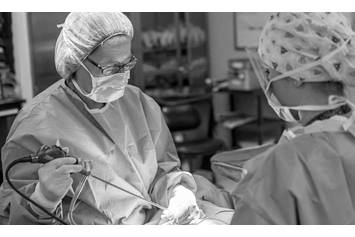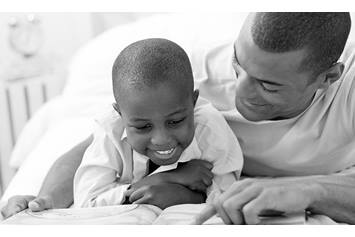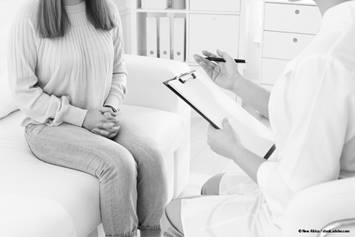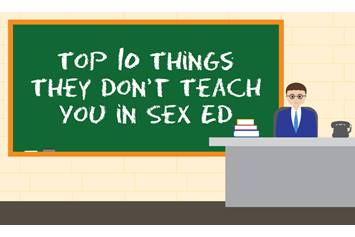Establishing with a Gynecologist

Transitional Care in Gynecology: When Should Your Child Switch to an Adult Provider?
A woman’s first visit to an adult GYN practice is a great opportunity for her to take further ownership of her gynecologic health as she transitions to another stage in her life. An adult GYN provider treats women’s breast and pelvic health issues and associated surgical needs, hormonal issues, pregnancy and postnatal care.

Not Your Mother's Gynecologist: Why Adolescent Girls Should See Their Own Specialists
Although adult gynecologists treat conditions in older women, differences in the anatomy of children make the advanced training of a pediatric and adolescent gynecologist valuable.

Gynecologic Assessment in CCPR
The gynecologic assessment with our Center for Colorectal and Pelvic Reconstruction (CCPR) team begins with a review of all medical records available to us at the time of intake.
HPV Vaccine Information

The Human Papilloma Virus Vaccine: Safe and Effective!
The HPV vaccine protects against the viruses that cause cervical cancers and genital warts, as well as some types of anal, mouth and throat cancers. With the HPV vaccine, this generation can substantially reduce their risk of these cancers, some of which are deadly.
Menstrual Cycle Resources

Period Products: What Teens Need to Know
Managing menstrual flow can be challenging for teens. Thankfully, there are several period products to choose from. Understanding the available options will help you choose the product (or products) that are best for your body and lifestyle.

Period Problems: 4 Common Menstrual Issues for Young Women
A girl’s period can add a new challenge to the already-difficult teenage years. Some of these issues can be typical, but others may need to be evaluated by a healthcare professional.

PMS: Learn the Facts About Premenstrual Syndrome
Most women of reproductive age experience mild behavioral or physical symptoms a few days before their period. These combined symptoms are considered premenstrual syndrome (PMS).

Menstruation in Adolescents: The Importance of Using Menses as a Vital Sign
Adolescence is a time of many new things – including puberty changes and the onset of menstruation. A first period can be an exciting experience, but one that may cause some anxiety for young women and their caregivers.

Menstrual Manipulation for Patients With Disabilities
Adolescence can be a period of turbulence and transition for both teens and their parents or caregivers. Teens with disabilities—physical, intellectual, or both—also encounter the challenges of adolescence, particularly when it comes to pubertal development, menstruation and sexuality.

Heavy Periods: Causes, Symptoms and Treatment
Heavy menstrual bleeding is a common problem during adolescence. Heavy menstrual bleeding can negatively impact quality of life, school attendance, and participation in after-school sports and activities.
Ovarian Cysts/ Masses

Polycystic Ovary Syndrome: What Is It?
Polycystic ovarian syndrome – or “PCOS” – is a hormonal imbalance that happens in some girls and women. In PCOS, testosterone, a type of hormone, is higher than normal.

Primary Ovarian Insufficiency: Teenagers in Menopause
Primary ovarian insufficiency means that the ovaries have stopped working at a younger age than typical. It used to be called premature ovarian failure and is often called premature menopause. In POI, the ovaries stop producing hormones and eggs, resulting in hormone deficiency and infertility.

Ovarian Torsion: What Parents Need to Know
Ovarian torsion needs to be considered in any girl or young women who complains of sudden onset abdominal pain, particularly when the pain comes with nausea and/or vomiting.

Ovary Preservation: A Practice in Preserving Your Future
Nationwide Children’s multi-team algorithm helps us work together to minimize unnecessary removal of ovaries in the absence of concern for cancer as well as make sure the correct surgery is done to spare ovarian function.
Pelvic Pain

It's Just Cramps - or Is It?
The majority of young girls have experienced menstrual cramps. Unfortunately, some girls also experience additional symptoms such as pain down the legs, diarrhea, nausea, vomiting, headaches, worsening migraines and passing out. What happens when medications don’t work? When young girls continue to have pain despite these first-line therapies, it is important to consider that the pain may be more than just cramps.

Endometriosis in Teens and Adolescents: More Than Just Cramps
Endometriosis is a condition in which the menstrual tissue is found outside the uterus, within the pelvis. Girls who have a mother, sister or aunt with endometriosis have an almost 10 times increased chance of developing it.

Kids and Pain: Treatment and Care After Surgery
After a surgical procedure, a person is often told to take a pill every few hours to feel better. According to guidelines from the American Pain Society, there are better options than just a pill for postoperative pain management.
Vulvar and Vaginal Concerns

Vaginal Inflammation and Irritation: Treating Vulvovaginitis
Vulvovaginitis, or inflammation and irritation of the genital area, may occur in females of any age – including newborns, toddlers, and children, but it most commonly occurs in girls who have not yet started puberty.

Labial Adhesions: The Gynecological Problem You Haven’t Heard About
When the inner lips (labia minora) of the vagina become stuck together, it is called a labial adhesion. This is typically seen in girls between the ages of 3 months and 6 years old.

When Your Daughter Wants Plastic Surgery: What Parents Need to Know About Labial Hypertrophy
As more teens are seeking elective labial surgery, the American College of Obstetrics and Gynecology through the Committee on Adolescent Health Care has developed guidelines to educate gynecologists about the limited role of surgical interventions for this group of patients.
Sexual and Reproductive Health

Tips for Talking With Your Parents
When the time is right to talk to your parents about birth control, there are a few small things you can do to help the conversation go smoothly.

Birth Control Myths
When it comes to birth control, there are a lot of myths out there. And those myths might leave you with a lot of questions. Get the facts.

Which Birth Control is Right For Me?
The implant. IUDs. The shot. Learn more about available birth control methods.

What Types of Birth Control Are 99% Effective?
Parents are probably familiar with the birth control pill, but there are other options of birth control available for your teen that don’t have to be taken every day.

What You and Your Teen Need to Know About Male Birth Control
Teens are responsible for their own health and should prioritize the health of their partner as well. Parents and trusted adults also play an important role by encouraging communication about healthy behaviors and relationships.

Sexually Transmitted Infections: What You Need to Know
Sexually transmitted infections are infections that are spread from person to person through sexual contact, including vaginal, anal, or oral sex, or other skin to skin contact. They can be caused by bacteria, viruses, and parasites.

Teens and Pregnancy: 10 Things They Don’t Tell Your Teen in Sex Ed
Some parents may find it awkward or difficult to talk to their kids about sex. Here are a few things they may not have learned in health class.

PediaCast 331: Talking To Children and Teens About Sex
Dr. Elise Berlan and Dr. Wendy Anderson-Willis join Dr. Mike in the PediaCast Studio for a discussion on talking with kids and teens about sex.
Helping Hands
Birth Control: Contraceptive Patch
Learn about the birth control option for women, the contraceptive patch.
Birth Control: Depo Provera®
Learn about the birth control option for women, Depo-Provera.
Birth Control: Emergency Contraception
This Helping Hand™ is about different forms of emergency contraception and when to use them. Your doctor or health care provider can help you choose the best one.
Birth Control (Contraceptive) Options
Birth control is safe, easy to use, and has few side effects. Finding the right method for you can help you prevent pregnancy until you want to become pregnant.
Birth Control Pills
Combination oral contraceptive pills are a form of daily birth control that has the hormones estrogen and progestin.
Birth Control: Vaginal Ring
The vaginal ring is a birth control you place in your vagina.
Condoms
Condoms should be used while having sex. They help prevent the spread of sexually transmitted infections (STIs) and reduce the risk of pregnancy.
Genital Warts (HPV Infection)
Genital warts are skin-colored, cauliflower-like, painless growths. They are caused by the Human Papilloma Virus (HPV). Genital warts are usually spread by sexual contact. During pregnancy or delivery, the HPV virus can be passed on to the baby from an infected mother.
Low Maintenance Contraceptives
Low maintenance contraceptives, also called Long Acting Reversible Contraception (LARC,) are the most effective reversible methods of birth control available to reduce unplanned teen pregnancy.
